How to know my ideal keywords for SEO?
If you want to know the best keywords for your company’s website, you should do a keyword search or keyword research. To do this, you can use Google Keyword Planner or combine this tool with other free ones such as Google Suggest, Google Trends, Ubersuggest and Answer the Public .
To position your company on the first page of Google with this procedure, you must first understand what a keyword is:
A keyword is any word or phrase that speaks about your company, the service it provides, the product it sells or the industry to which it belongs.
For example, if your business is related to pets, some keywords could be:
-“Where to leave my dog on vacation”.
-“Eliminate fleas in cats”.
-“Can I give my pug a haircut?”
They can be long, like the previous examples, or as short as “dogs”, “cats” or “pets”.
In this article is the detailed and in-depth explanation of how to do a keyword research step by step . If you don’t have time to read it, maybe the video format is better for you or jump to the conclusion :
What are long tail keywords?
They are “long” keywords, made up of phrases instead of words.
To position your website in Google, it is important to keep in mind that a long tail keyword is preferable to a short one .
Why?
Because phrases (“remove fleas on cats”) usually have more purchase intent than words (“cats”).
Someone searching for “dog” may just need a photo for their wallpaper, while someone who writes “how to bathe my dog” undoubtedly owns one and therefore is part of your target audience.

Also, the competition to rank decreases as the keyword becomes specific.
As we mentioned in our guide to writing perfect SEO content :
[With a long tail strategy], you are much more likely to get to the first page of Google and gain authority in the industry.The key is to conquer small territories until, after months or years, you realize that you already dominate the market in the online world.
What is keyword research or keyword research?
This is a process to find out the terms that your potential customers are using when they want to search for everything related to:
a) Your industry.
b) The products or services that you and your competitors sell.
c) Frequently asked questions that the average consumer has.
In addition, keyword research allows you to know what the rest of the market is doing and calculate whether or not it will be difficult to position the pages of your website .
If, for example, there is already too much content on “Remove fleas on cats”, you may have to choose another theme for the content you decide to create.

What are the main objectives of keyword research?
1. Understand the language of your audience:
It is not enough to know what your potential leads are interested in: you also have to know how they express themselves.
Sometimes, it’s easy to lose sight of the fact that you don’t think like your consumers:
In order to answer their concerns and questions, you must formulate them in the same way that they would. That is, using the same words.
Maybe you can think of title a page “How to adopt puppies in Caracas?”, when you would get more traffic with the option “Process of adopting puppies in Caracas”.
2. Determine what content you should develop:
Locating the most valuable keywords for your product or service will also lead you to know what your competition is saying about that topic .
To rank, then, you may have to aim to answer questions that no one has asked before or answer the most popular ones with outstanding quality .
“This book begins with an obsession: ‘What is my client thinking?’ And when I say ‘obsession’, I really mean it. It’s going from ‘What are they thinking?’ to ‘What are you looking for? What do they wonder, feel, and fear?’” – Marcus Sheridan in They Ask, You Answer .
Where to put the keywords within a website?
It will not be enough to identify which are the queries with which you want to position yourself in the search engines.
You must also put them in strategic places so that your objective is achieved:
- In the titles , H1s and meta descriptions of your pages.
- In deep, detailed and high-quality articles that address each of the chosen topics.
Remember: your goal is that every time someone searches for those keywords, your brand appears on the first page of Google:

Keyword Search Pages (Free)
Some of the most popular free keyword research tools are:
- Google Keyword Planner.
- Ubersuggest.
- Answer the Public.
- Google Trends.
The next section of this article explains how to use each of them, individually and in combination with each other.
Steps to do a keyword research
Checked and recommended by us, here are the steps to follow to get the best possible keywords – all with free tools within the reach of a couple of clicks.
This procedure should be done after the most important step: identifying your buyer .
It may seem obvious, but it is a step that many overlook.
After all, if you’re not clear on who your target audience is, it’s going to be a real challenge to know what topics interest them.
We thank Alejandro Sanoja for teaching us several of the steps described below.
How does Google Keyword Planner work?
Recently, this free tool from Google was renewed and is now more complete than before.
Many believe that this platform is not free because to access the keyword search engine it makes you generate an Ads campaign.
Here we leave you a video where we explain how to carry out a keyword study through Google Keyword Planner:
Don’t worry: you can use it without having to hire Google’s advertising services.
How? Very easy. You just have to create the campaign (it can be with fictitious information) and then cancel it.
Access to the Keyword Planner will now be unlocked for you.
Once there, select the option “Get new keywords” and perform these steps:
- Enter two or three words that are relevant to you and with which you would like to position yourself.
- Configure the language in which you have your website and want to create the content to position.
- Select the countries where your ideal buyers and users are. You can bookmark up to 10 locations.
A list with keyword ideas will be generated with the following information:
- keyword.
- Search volume: number of times the word is searched for monthly in the locations you selected.
- Competition: on a scale of 1 to 100, how difficult it is to position yourself with that keyword.
- Bid range or bid range: it is the amount that indicates how much other companies are paying Google Ads to be advertised in the search engine with that keyword.
Google will first show you the keywords you searched for and then, sorted by relevance, are the keyword ideas or keyword suggestions:
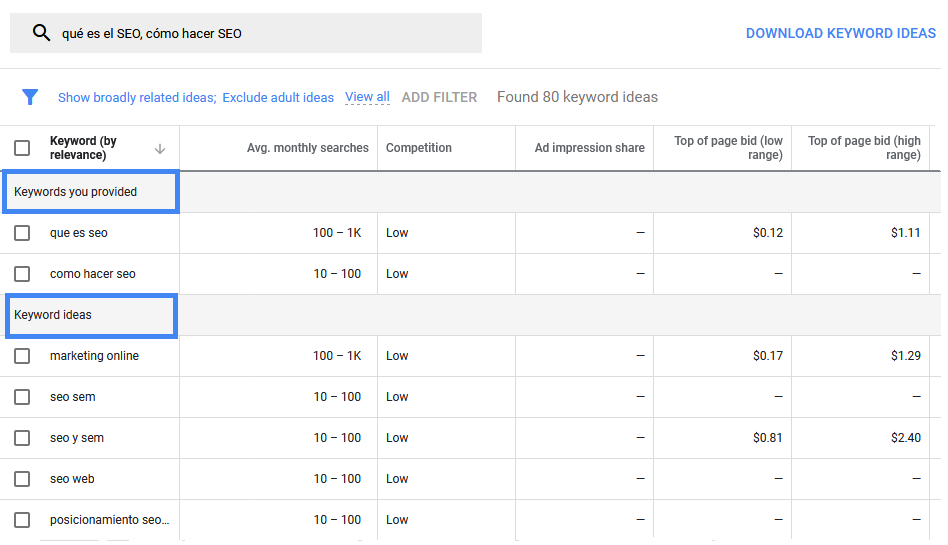
You can filter the search for a certain period of time.
If you do not modify this information in the upper right corner of the page, it will show you by default the one corresponding to the last year.
Also, on the left is a cool section where keywords are grouped according to topics and subtopics:
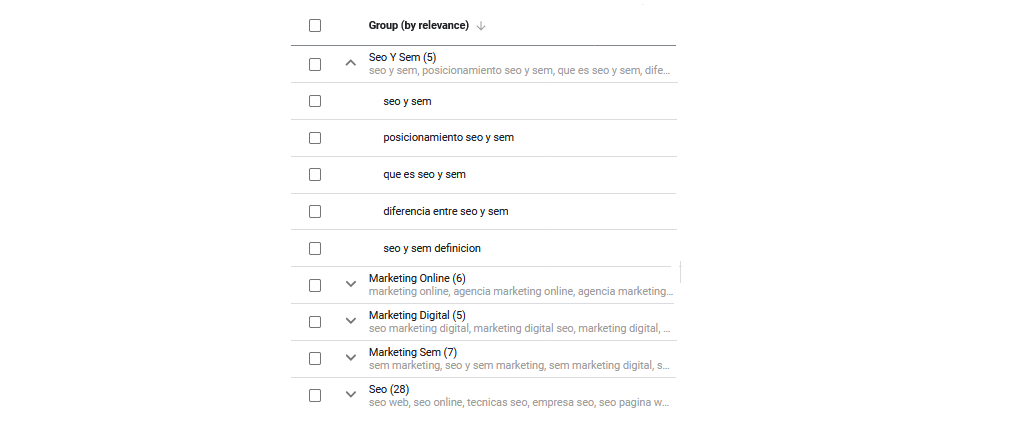
This will allow you to approach the different possible options in an organized way.
The ideal keyword is one with high search volume, low competition, and high monetary value.

This means that many people are doing that search, there is not enough content to answer it and there are companies that bet a lot on those keywords.
In other words: a golden opportunity for you, who will focus on creating quality content to gain the trust of your potential buyers.
You can base on what you see here to select your keywords at once, or use the following tools for a much more thorough and detailed search.
If you go the long way, using the Google tool will only be the first filter of the investigation to get your precious keywords.
If so, we recommend compiling all the information in a spreadsheet (Excel or Google Sheets) to keep the research organized.
PRO TIP : Select the first row of the table and go to Home > Sort & Filter > Filter. In this way you can sort the content according to the criteria of each column.
From the list, highlight all those keywords that are relevant to your content.
They must also comply as much as possible with the characteristics mentioned a few paragraphs above: have high search volume, low competition and high monetary value.
Alternatives to Google Keyword Planner
How does Ubersuggest work?
This tool to facilitate the search for keywords belongs to one of the most recognized SEO experts in the world: Neil Patel.
If you wish, here is a video:
In addition, to use it you don’t even have to register.
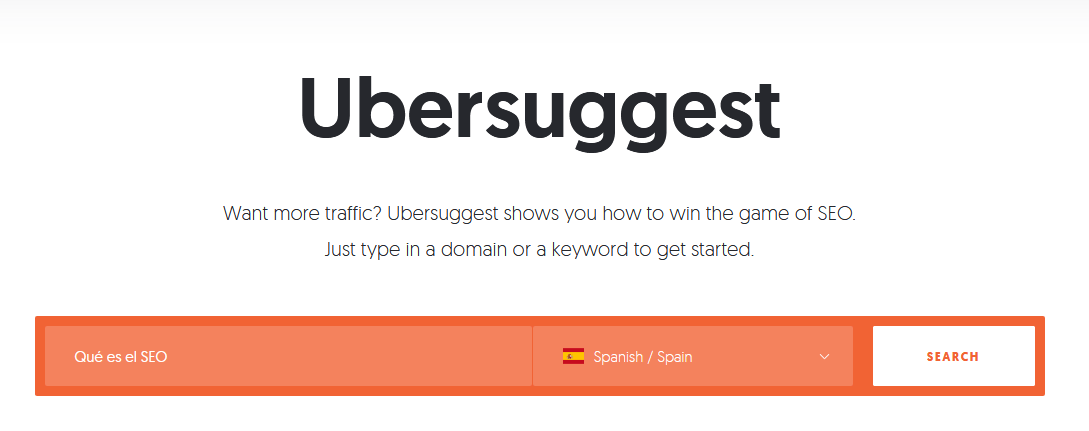
On the home page, perform these steps:
- Write in the search engine one of the words you selected in Keyword Planner.
- Select the most relevant country in your positioning, since, unlike in the Google tool, you can only select a location with its official language.
You will be able to see information comparable to that of Keyword Planner for each keyword (search volume and average cost per click) and two new metrics, of great interest:
- The SEO difficulty: how challenging it is, from 1 to 100, to position yourself organically.
- Difficulty pays: On the same scale, the complexity of positioning yourself by competing with ads.
As if this additional data weren’t already a gift from Neil to you, there are also more keyword ideas at the bottom of the graph.
Below the table, there is a button that says “See all ideas”.
The most popular competition results for each of the listed keywords will be available to you there:
Results that rank with a certain keyword in Ubersuggest

You will also find the number of average monthly visits they have and their shares on social networks.
Take the trouble to review those articles to see if your content can outperform them or if it is more realistic for it to rank for different keywords.
How does Answer the Public work?
On this website you will get the most frequent questions that people are asking on the Internet related to a keyword.
We explain this in the following video:
In the business of solving problems and doing it through trust, knowing exactly what people want to know is of tremendous importance.

Once on the home page of the tool:
- Enter the topic of your research in the search engine. It is recommended to write up to two words for best results.
- Select the main country where you want to position yourself.
The results are possibly the most complete and detailed formulations you will get as to what your leads are asking on Google.

How to interpret the graphs?
The darker the green circle next to the question, the more searched it is.
Therefore, it is what you should write about on your blog, talk about on your YouTube channel, or discuss on your podcast .
There is only one negative point of this tool: it allows you 3 free consultations daily. Use them wisely!
How does Google Trends work?
This Google tool is, without a doubt, one of my favorites.
It is free, simple and very useful.
It allows you to know the behavior of a keyword over time, in different regions and in comparison with others.
How to use it?
- Enter an initial word in the Home of the tool.
- Once the word graph loads, you will see the option to “Compare” next to the keyword you entered. You can compare up to 5 terms at a time.
This becomes essential when you have to select between several potential keyword options and want to make sure you make the best possible decision.
Obviously, you should focus your attention on those keywords that have a positive trend at the time you are going to use them.
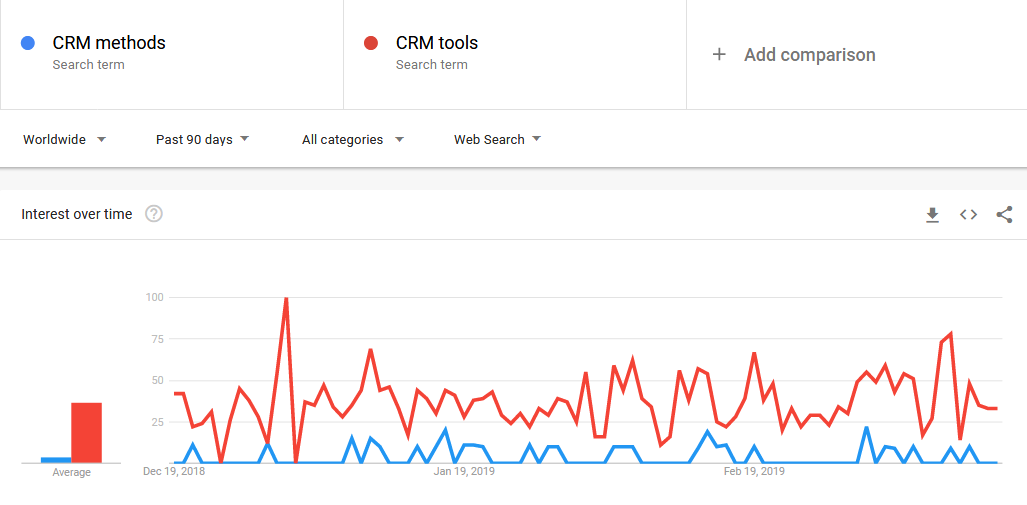
How do I know what keywords Google is positioning me with?
If you want to do research on the keywords you already compete for , we have two free solutions for you:
- Use Google Search Console.
- Use the Ubersuggest Google Chrome extension.
In Search Console , in the “Performance” part, you can see which specific queries attract visits to your website.
This is of tremendous help, for example, if you want to refresh content that you have already published a long time ago .
On the other hand, the Ubersuggest extension will tell you:
- Which organic words you compete for.
- What average position do you appear in Google with that query.
- How many estimated visits that query brings you per month.
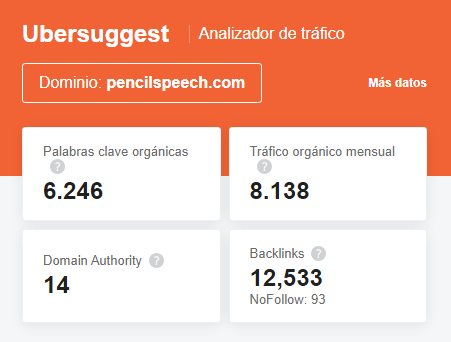
How do I know what keywords my competition uses? (Free)
Likewise, you can use the Ubersuggest Chrome extension to find out what keywords your competition ranks with.
You just have to:
- Install the extension.
- Go to your competitor’s website.
- Click on the extension icon and wait for the panel it shows to load.
- Click on the “Organic Keywords” box and revel in the data.
This information is not as precise as what you could have by owning the website, but it is a great option to evaluate the weight of your competitors in Google for free.
Extra tips to do a keyword research
1. Be a stalker (healthily)
Do some research on the internet and find out where your potential customers hang out online.
Every niche market has favorite platforms: Twitter, TikTok, Pinterest, and specialized forums are just a few of them.
Identify those meeting places and look at the topics related to your brand that interest your leads.
2. Search Quora and Reddit for FAQs
On these pages, users ask questions on any topic and start discussions around them.
Doing a search here is another good strategy to identify topics relevant to your audience and the exact words they use to refer to them.
3. Go further
Choose one of the keywords from the research and google it.
Scroll down to the bottom of the page to see the “Related Searches” section .
It is a place where there are also interesting terms linked to your content.

Conclusions
Keyword research is not a quick task, but it is not impossible either.
For keyword research to be effective, you must first know your audience and your positioning objectives very well.
Some of the ideal tools to do this without paying a penny are Google Keyword Planner, Ubersuggest, Answer the Public and Google Trends.
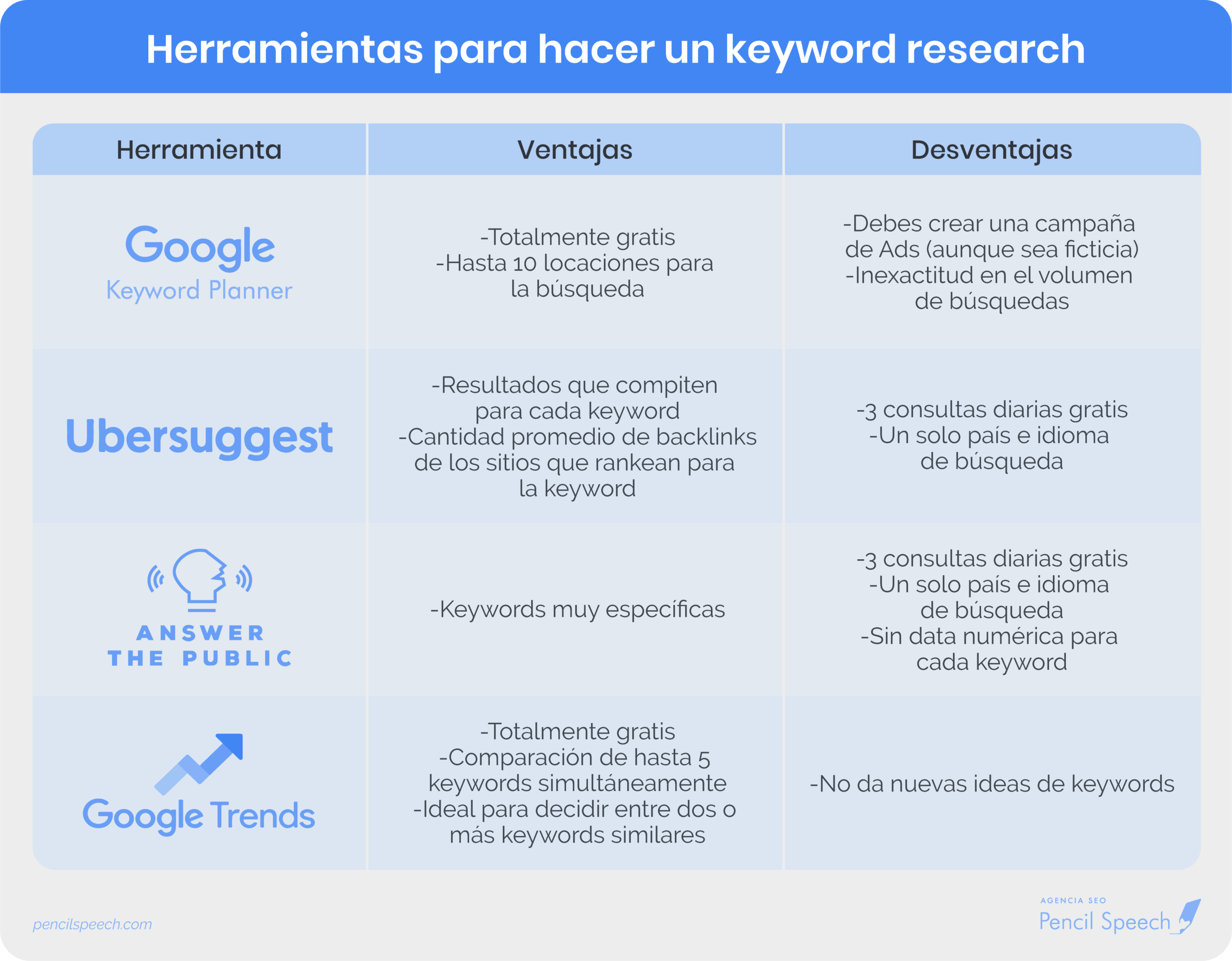
Do not lose that keywords are not everything: the quality of the content is what Google rewards. It is useless to saturate hollow content with keywords.
Our last recommendation: always write with the user in mind.



